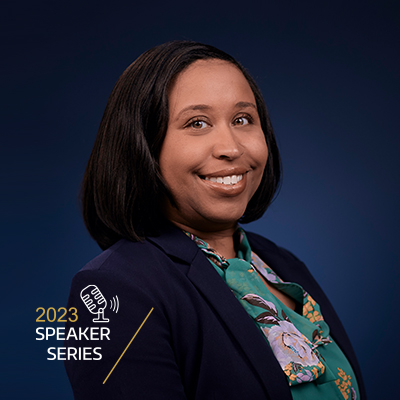Home > SMART Center 2023 Virtual Speaker Series: Equity-Centered MTSS and Implications for School Mental Health

Please Note: Certificate of Attendance and Washington state clock hours will be available for attendees of the live session.
Description:
A large component of transformative systems change is dependent upon an adopted foundational framework. MTSS is the framework to leverage equitable practices. This session will describe the power of equity, inclusion and belonging to create positive student outcomes.
Objectives:
Materials & Resources:
 Nikole Y. Hollins-Sims, Ed.D.
Nikole Y. Hollins-Sims, Ed.D.
Technical Assistance Coordinator for the Midwest PBIS Network
Nikole Y. Hollins-Sims, Ed.D., is an educational consultant & strategist. She currently serves as a technical assistance coordinator for the Midwest PBIS network. Dr. Hollins-Sims is a former Special Assistant to the Secretary of Education at the Pennsylvania Department of Education (PDE). She has previously served as an educational consultant for the Pennsylvania Training and Technical Assistance Network (PaTTAN)-Harrisburg Office, where she was the co-statewide lead for the Learning Environment & Engagement initiative. Dr. Hollins-Sims is a Pennsylvania certified school psychologist and has conducted research around caregivers of children of incarcerated parents and their motivation to engage in family-school partnerships. Dr. Hollins-Sims has been awarded as a Moral and Courageous Leader for Education by Cabrini University in 2021, the 2021 American Psychology Association (APA) Anti-Racism School Psychology Emerging Professional Award and was named the 2021 Pennsylvania School Psychologist of the Year. In 2022, Dr. Hollins-Sims served as the lead author of the book titled: Creating Equitable Practices in PBIS. Dr. Hollins-Sims has also recently launched her own business, Hollins-Sims Consultation.
Description:
Equity and student mental health needs must be considered when utilizing the Multi-tiered system of supports (MTSS) framework. Doing the work requires educators to be aware of inequities within data and the present mental health needs of the students they serve. Intentionally connecting all available information when making decisions is key to successful implementation of tiered systems. This presentation will address the need to incorporate equitable and culturally responsive practices when implementing systems to support students.
Objectives:
Materials & Resources:
 Tynara Blount, M.S
Tynara Blount, M.S
Director of Culturally Responsive Positive Behavior Intervention and Supports (PBIS)
at The School District of Philadelphia
Tynara Blount is the Director of Culturally Responsive Positive Behavior Interventions and Supports (CR-PBIS) for the School District of Philadelphia. In this role, Tynara leads a team of 20 district-level CR-PBIS coaches who support over 100 public schools in their implementation of CR-PBIS. Her post graduate career began in the Criminal Justice system where she also volunteered to teach students at a local high school the techniques required to debate a court case. It was this experience with students that inspired her to enter the education field. Fully committed to students, teachers, and leaders, Tynara has dedicated the past 19 years to education to ensure equity and belonging are central to our collective work. Her past experiences include working as a School Transformational Facilitator at Johns Hopkins University. She also brings a wealth of knowledge from her tenure as a Director of Education, high school advanced placement teacher, District CR-PBIS Coach, Lead CR-PBIS Coach, and Assistant Director of CR-PBIS. Tynara earned a BS in Criminal Justice with a minor in Communications from West Chester University and a MS in Criminal Justice Administration from St. Joseph's University. She is a loving mother and a wife, happily married to her husband of nine years. Tynara is a champion and community-centered leader, committed to the daily support of ensuring schools work collaboratively with students, families and community members.
 Tianna Bilal, M.S
Tianna Bilal, M.S
Assistant Director of Culturally Responsive PBIS at The School District of Philadelphia
Tianna Bilal has been working in the education field for the past seven years. Prior to working in education, she spent 15 years working in the substance use/mental health field in various roles. Tianna attended The Pennsylvania State University, where she received her undergraduate degree in 2003, majoring in Human Development and Family Studies. She received her Master’s of Science degree in Criminal Justice in 2013. Tianna currently works as the Assistant Director for Positive Behavior Intervention and Supports (PBIS) for the School District of Philadelphia. In this role, she supports the implementation of PBIS in over 100 District schools.
Description:
The environment of schools comprises features of practice, policies, procedures, and beliefs. This presentation will discuss the types of bias-based beliefs educators bring into school that complicate the ways in which promising practices are implemented. Specific attention to elements of MTSS implementation that can be compromised by educator bias-based beliefs.
Objectives:
Materials & Resources:
 Edward (Eddie) Fergus, Ph.D.
Edward (Eddie) Fergus, Ph.D.
Professor of Urban Education in the School of Arts and Sciences at Rutgers University – Newark
Dr. Edward (Eddie) Fergus is Professor of Urban Education in the School of Arts and Sciences at Rutgers University – Newark. Prior to joining Rutgers University – Newark, Dr. Edward Fergus was Associate Professor of Urban Education and Policy at Temple University (2017-2022) and Assistant Professor of Educational Leadership and Policy at New York University (2013-2017), and Deputy Director of the Metropolitan Center for Urban Education at New York University (2004-2013). As a former high school social studies teacher, program evaluator, and community school program director, Dr. Fergus is continuously approaching research with an attention to its application within educational settings. Dr. Fergus’ work is on the intersection of educational policy and outcomes with a specific focus on Black and Latino boys’ academic and social engagement outcomes, disproportionality in special education and suspensions, and school climate conditions. He has published more than four dozen articles, book chapters, evaluation reports, and five books including Skin Color and Identity Formation: Perceptions of Opportunity and Academic Orientation among Mexican and Puerto Rican Youth (Routledge Press, 2004), co-editor of Invisible No More: Disenfranchisement of Latino Men and Boys (Routledge Press, 2011), co-author of Schooling For Resilience: Improving Trajectory of Black and Latino boys (Harvard Education Press, 2014), author of Solving Disproportionality and Achieving Equity (Corwin Press, 2016), co-editor of forthcoming book Boyhood and Masculinity Construction in the US (Routledge Press, forthcoming), and Unpacking the Cultural Shopping Cart: The Cross-Cultural Lives to Challenge School Segregation (Corwin, forthcoming). Fergus has worked with over 120 school districts since 2004 on educational equity and school reform, specifically addressing disproportionality in special education and suspension. Fergus partners with state education departments such as California, Maryland, Connecticut, North Carolina, and Texas and serves on various boards such as NY State Governor’s Juvenile Justice Advisory Group (2010-present), appointed in 2011 to the Yonkers Public Schools Board of Education (2011-2013 and 2019-2021), National Center on Learning Disabilities (2020-present), and is an expert consultant for the U.S. Department of Justice Civil Rights Division on Educational Opportunities (2014-2016), New York State Attorney General’s Office (2022), and NAACP Legal Defense Fund (2018).
Dr. Fergus received a bachelor’s degree in Political Science and Secondary Education – Broad Field Social Studies from Beloit College and a doctorate in Educational Policy and Social Foundations from the University of Michigan.
Want more information and school mental health resources? Visit the Northwest MHTTC's School Mental Health page and sign up for our newsletter for regular updates about events, trainings, and resources available to the Northwest region.